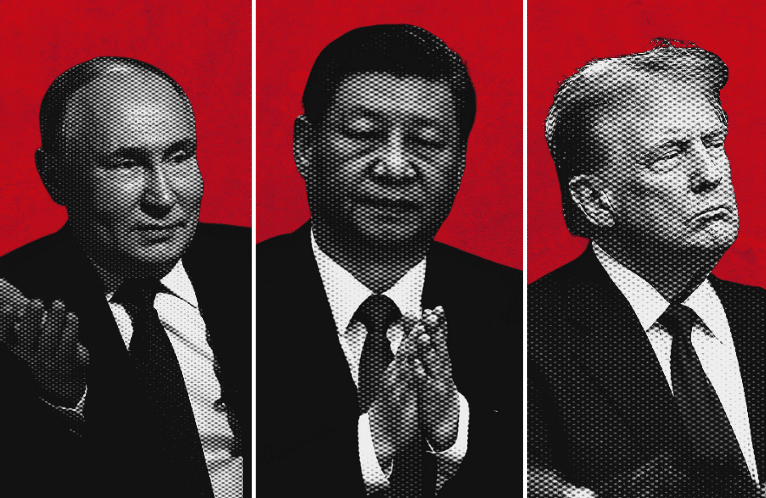One Belt One Road: International Perspectives
China’s One Belt One Road (OBOR) initiative, if successful, would significantly alter global trade across Eurasia. Yet given the vast scale and scope of the project, China alone is incapable of seeing it to success. Indeed, China will need the input and support of other nations if it is to manage the gargantuan task of standardising and/or establishing cross-continental connections of any sort. Thus, it is important to understand where these other nations stand on the idea, and whether they (will) support it or not. The following is a partial overview of some of these perspectives.
Many of the links for the Silk Road Economic Belt will travel through Eurasia. Russia, as the historical power of the region, has appeared largely receptive of OBOR, seeing it as an opportunity to revive its flagging economy and promote its own reputation and initiatives, such as the Eurasian Economic Union (EEU). In 2015, Presidents Xi Jinping and Vladimir Putin both agreed to coordinate their respective EEU and OBOR economic initiatives, and just recently Russian foreign minister Sergey Lavrov met with Chinese foreign minister Wang Yi to discuss preparations for upcoming presidential meetings and cooperation in other multilateral fora. Nevertheless, there are some in Russia who fear that the success of OBOR will negatively affect Russia’s influence in the region, especially if Beijing chooses to engage with the region bilaterally instead of the through the EEU or other multilateral organisations. Whilst this is true to some degree, commentators have noted that Russia is well-suited to act as the security guarantor in the region given its strong ties to Central Asia and experience in guaranteeing security. The other Central Asian states, meanwhile, have all generally welcomed the idea.

In Europe, the end of the Silk Road, there are mixed responses to the initiative. A December 2016 report from the Brussels-based Egmont Royal Institute for International Relations has compiled analyses of the OBOR perspectives of numerous European Union (EU) members. The most positive and concrete responses appear to be in relation to the Asian Infrastructure and Investment Bank (AIIB) – a Chinese-led organisation indirectly and unofficially related to OBOR that many European states have opted to join. The decision to join, however, was made by individual national governments, not as a collective though the EU. Additionally, national level responses have been mixed, with a greater level of support and interest from local governments keen to capitalise on the development potential of attracting Chinese investment, with national-level responses (and the response of the European Union) characterised more as reactive, piecemeal, and uncoordinated. Despite this, there are indications that this is gradually changing. The president of the European Commission (EC) Jean-Claude Juncker has stated in an interview that he cannot see any reason for European initiative to not collaborate with OBOR, and that both China and Europe can benefit from greater cooperation. European businesses, too, despite their respective national government’s stance, have been eager to capitalise on the opportunities afforded by OBOR. A greater response is likely from European governments as more concrete OBOR proposals and projects are put forth.
In contrast to the generally neutral or positive responses of Europe and Eurasia, the US has been at best hesitant and at worst critical of China’s global initiatives like OBOR and the unofficially related AIIB. The US has so far not joined the AIIB despite many of its traditional allies, like Australia and the UK, doing so. It has cited fears over sub-par regulatory standards on, for example, environmental protections and anticorruption, and how China may gradually reorganise the global economy to the detriment of US interests as reasons for its hesitation. However, there have been conflicting reports over how the new Trump administration views OBOR and AIIB, with some suggesting Trump’s scepticism for multilateralism would curtail his interest and support, and others concluding that it would serve as an opportunity to improve Sino-US ties and improve US infrastructure. As of yet, Trump himself has not commented on either the AIIB or OBOR.

India, as a partner in one of OBOR’s projects (the Bangladesh-China-India-Myanmar Economic Corridor) is unlike the US or Russia: although it is one of the founding members of the AIIB, it has remained largely neutral and silent on the OBOR, despite many of the proposed routes passing through or close to areas of strategic interest to India (such as the Indian Ocean and Pakistan). However, in March 2016, various Indian government ministers gave an implicit rebuke of OBOR, expressing concerns over China’s increasing cooperation with Pakistan through China-Pakistan Economic Corridor (CPEC) projects, the motives and beneficiaries of the OBOR initiatives, and the negative effects that could ensue from such unilateral actions. India, though not strictly averse to OBOR, would be concerned if it appeared the majority of the benefits would accrue to a single country. India is supportive of the AIIB, for example, because it views it as a cooperative and inclusive initiative, but less so for OBOR.
Given its sizeable economy, Japan could prove to be a significant partner in OBOR success. Yet perhaps unsurprisingly given its chequered history with China, Japan has not immediately offered open support for either the OBOR or the related AIIB. Like the US, the Japanese government has in the past been generally sceptical of the AIIB due to a perceived lack of transparency in its management and concerns about its governance, yet has been careful to not reject it outright, suggesting that cooperation between the AIIB and the Asian Development Bank is desirable and possible if there was enough congruence in standards and regulations. On the OBOR initiative in general, Japan has been cautious, reserving judgement until more concrete proposals are offered. Indeed, some commentators have drawn comparisons with OBOR to Japan’s own regional infrastructure initiative – the Partnership for Quality Infrastructure – suggesting it is an implicit counter to China’s more evocative-sounding One Belt One Road plan that takes advantage of Japan’s better record of producing high-quality projects.

Clearly, the international response to OBOR has been mixed, with those regions directly targeted by the initiative – like Europe, Russia and other Central Asian states – generally either neutral or positive about its prospects (in spite of some concerns over regional influence and the exact nature of the plan). Conversely, those that are not directly targeted – like Japan, India, and the US – are overall more sceptical due to concerns over the motives, likely beneficiaries and standards of its various projects, and the possible erosion of their status in the region and the world. Whether or not these perspectives of OBOR change (for better or worse) will depend largely on the nature of its future efforts, as for the moment OBOR is still very much in development without a proven track record.
Further reading: http://www.aph.gov.au/About_Parliament/Parliamentary_Departments/Parliamentary_Library/pubs/BriefingBook45p/ChinasRoad
By JUSTIN ELLIOTT FEB. 28, 2017
Justin Elliott is a Spring 2017 intern in the Carter Center’s China Program.








